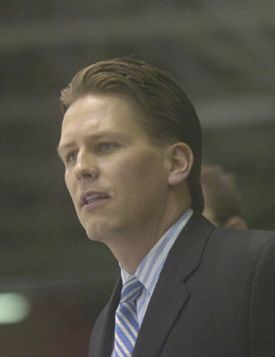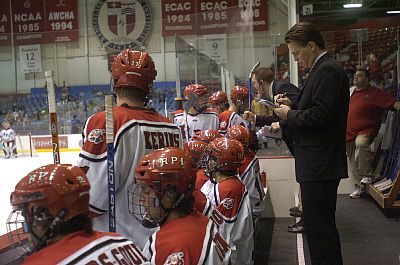“Honey, we’re moving to Troy, New York.”
For many, and on their own, the words wouldn’t be considered a measure of excitement, given the reputation Troy has gained over the years as a burned-out burg, a city with its glory years of the Industrial Revolution well behind it.
For Seth Appert and the hockey program at Rensselaer, however, those words marked the beginning of a new and increasingly optimistic era in the Collar City as he informed his wife Jill — with her input, of course — that he had been hired to become the 12th head coach in the history of Engineers hockey.
The New Foreman
“I never got into coaching because I thought one day I would want to run my own program,” says Appert. “I got into coaching because I love hockey.”

Following the resignation of long-time head coach Dan Fridgen, who departed as the winningest coach in school history, a hotly contested application and speculation process began for what quickly became the most sought-after vacancy of the 2006 offseason. At least two former NHL head coaches and dozens of current and former NCAA head coaches and top assistants were either rumored or confirmed to have applied and/or been considered for the job.
At first, Appert flew under the radar despite his outstanding record at the University of Denver under George Gwozdecky.
“I knew the tradition of the hockey program and I knew about the two national championships and how there was a great reputation academically, but after that I didn’t really have much knowledge about the school.”
Ken Ralph, then the athletic director at Rensselaer, contacted Appert by phone, but nothing substantive happened until a recruiting trip for Denver to western New York.
“I had a day off in Rochester and decided to drive over on my own. I walked the campus and got the chance to meet Ken, and as the day went on I realized that I was in a very special place. Even just by being on campus, you could tell that there were a lot of positive things happening. That’s when my interest really became serious.”
So Appert started doing his research and learned what there was to know about RPI as an institution and as a program. He interviewed, and eventually was named one of three finalists for the position, along with one of the former NHL coaches and another top assistant at one of the elite schools in the nation.
Ultimately, the position was offered to Appert, and he took the reins of a program mired in a historic funk. The Engineers finished the 2005-06 season with a 14-17-6 record, marking several ignoble feats — the first consecutive losing seasons since the late 1980s, and the first time failing to meet the 15-win plateau in consecutive years since the mid-1970s. The previous year had been only the second 20-loss season in school history.
Once a staple at the ECAC Final Four, the Engineers have not seen tournament success since 2002, when it was the Final Five in Lake Placid. The senior class of 2006 became the first never to make an appearance at the league’s neutral-site finals since the class of 1982, one of the final years before the school began granting athletic scholarships for the first time, and during an era where only eight teams out of 17 made the postseason at all.
His challenge: rebuild the program in his own image, and restore success on the ice.
The New Blueprints
Appert’s pedigree was hardened against some of the fiercest competition in the nation. Even when his teams were not among the best in the nation, they were regularly playing those teams in conference night in and night out.
“When I was at Ferris State, the CCHA was arguably the best league in the country,” he says of his days as a player, facing off against the mighty Michigan and Lake Superior teams of the mid-1990s, among others.
The paradigm started to shift after he took the assistant’s position at Denver. “A lot of the programs of the WCHA started to improve just before I started there,” he says, “and a lot of that is thanks to the commitments that each of the institutions made to hockey. Schools across the league were putting plenty of resources into their programs and recruiting just took off.”
Not only did the Pioneers win two national championships during his tenure there, the league itself won six NCAA crowns overall during his nine years in Denver.
“There’s a lot of open, free-wheeling hockey in the WCHA,” he says. “The league as a whole is more offensive-minded.”
And that’s exactly the type of hockey Appert wants to play in Troy.
“We aren’t planning to shy away from our defensive responsibilities. I think we can be a great offensive team with a lot of speed and still be very good defensively, but we do want to be an offensive-minded team. We want to have our defensemen be able to get up into the play and join the attack.”
It isn’t just the influence of George Gwozdecky and the WCHA that helped Appert draft his blueprint, though.
“I just happen to see the game that way. I enjoy coaching that style, and a lot of the elite recruits in the country want to play the game that way too.”
He doesn’t expect that importing the WCHA style will make the Engineers untouchable by any stretch of the imagination, but Appert does expect that it will make the team more than competitive in the long run.
“We’re excited to bring this style into the ECAC, but that’s not to say that there aren’t currently some teams which have an offensive focus. We’re just going to try to be more of a speed-oriented transition team in the next few years.”
The New Crewmen
Appert and his lieutenants, former Maine standout and NHL veteran Jim Montgomery and former Army and Bemidji State assistant Shawn Kurulak, have wasted no time in applying the new game plan to the arena of recruiting.

They are very particular about the type of player that they are looking for, but all three men believe they can attract exactly what they need to return the program to some of its past glories.
“We believe we can get back to being a national powerhouse, and we want to recruit young men that see themselves competing for a national championship at RPI,” says Appert. Any coach in the NCAA worth his salt would easily say the same thing.
But Appert goes deeper: “At the same time we also are looking to recruit young men who come from families that value education. If we’re recruiting against a big name school that may not be as strong academically and the young man is only interested in hockey and that’s all he cares about, he might not be picking RPI, but he also might only be playing for a year or two before he moves on to the National Hockey League.
“We want a more rounded individual — we want men who want to win championships and play in the NHL, but also men that value the family atmosphere that we want to foster in our program and also value the education that they can get at Rensselaer.”
To this end, Appert’s first full recruiting class as head coach included several young players from out west who were drawn by the promise of immediate playing time without having to stop over for a year or two in the junior ranks — something which most western teams would not be able to offer.
“I don’t know if that’s going to be the trend. At times when the situation calls for it and the right individual comes along, it’ll happen.”
Three young Minnesotans fit the profile in the Class of 2011 — defensemen Bryan Brutlag and Jeff Foss, and forward Chase Polacek. Each is only a few months removed from graduating high school.
“In those cases, there were three young hockey players that I was aware of that were great students and talented hockey players who had an interest in coming out east and not playing in the USHL. When I was hired there were 80-some kids already committed for 2007, so a lot of the best junior hockey kids were already taken. We had to get a little more creative when it came to infusing the talent level in the program. We needed the talent level and we needed the speed.”
So far, all three appear to be playing crucial roles for the Engineers this season. Each has suited up in all of the team’s seven games. Brutlag and Foss have been key components of the RPI defense, while Polacek leads the team in shots and is tied for fourth on the team in scoring.
Other members of Appert’s first recruiting class have stood out as well. Forward Tyler Helfrich has already been named ECAC Hockey rookie of the week twice, and sophomore Peter Merth, Appert’s first recruit at RPI, has developed into a key two-way defenseman — exactly the prototype for the new scheme.
The New Foundation
Even the most casual observer would have been able to pick out the Engineers at the Ice Breaker Tournament, sticking out as a sore thumb among teams universally recognized as being among the top programs in the nation — Boston College, Michigan, and Minnesota.
Further, the coaches at those schools — Jerry York, Red Berenson, and Don Lucia — had combined for nearly 1,900 NCAA victories during the course of their careers. Then there was Appert, who arrived in St. Paul with … 11.
“We didn’t have a tournament banquet or anything, but I think if all the coaches had had the opportunity to speak I would have had to tell our guys that they were getting the short end of the stick in terms of coaching experience in the tournament, considering how impressive those three gentlemen have been not just for their programs but for all of college hockey,” said Appert.
Roundly picked to finish last on the weekend, the Engineers did just that. However, the manner in which they conducted themselves during two losses at the Xcel Energy Center turned some heads, and turned a few doubters into believers. By the end of the weekend, there was little doubt that the team had stood its ground and had belonged.
It seemed to be an upset shocker in the making as RPI jumped out to a 3-0 lead in the second period against then-No. 5 Minnesota before a stunned hometown crowd. The Engineers were winning draws, scooping up loose pucks, taking their shots, and blocking those coming from some of the top players in the game. The shocker, however, was not to be, as the Gophers clawed their way back into things late in the second and took the lead with less than two minutes to play.
The next afternoon against then-No. 2 Boston College, Appert’s charges again scored the first goal of the game and then battled the East’s top team until the bitter end, when they gave up two goals on an extended penalty kill to ultimately drop the contest 4-1.
Still, they were very much a part of games in which conventional wisdom had picked them to be trounced. It was of little consolation to Appert and the Engineers, despite the accolades that poured in from around the college hockey world.
“We went out there to win. We didn’t go out there to play well and lose. Our players were bitterly disappointed after not finding a way to pull out that victory against Minnesota. I’m pleased that we played well for much of the five-on-five play, but we did not go there for moral victories.”
The New Skyline?
For five years, the ECAC has held its championship tournament just nine miles to the south of campus at the Times Union Center in Albany. For five years, the team has been on the outside looking in. But over the last two years, RPI has dominated October in the building.
Last weekend, the Engineers won the Governor’s Cup by defeating Union and Colgate in Albany for the second straight year. They are the only team ever to hold the Cup.
Off to a 5-2-0 record, RPI has also returned to the national rankings for the first time since mid-November of last year, when the team went 4-1-3 in Appert’s first eight games behind the Engineer bench, including a win at Denver. Last year, however, things went downhill in a hurry, as early hopes were dashed behind the reality of the ECAC schedule as the team struggled mightily in the league setting after doing well early against non-conference opponents.
Cautiously, the Engineer faithful hope that this year will be different.
“Last year we didn’t set any goals because we needed to know where we were starting from,” says Appert. “This year we know what we have and where we want to go. We have very specific goals and we’re working hard every day to try to achieve them.”
And as he mentioned following last weekend’s tournament, those goals do not stop with the Governor’s Cup.
Whatever the winds of fortune bring to the men of Troy this season, their leader is ready to dig in for the long haul.
“We love the area, we really do,” Appert says of his family’s move to the Capital District. “We couldn’t be happier here, both professionally and personally. It’s been very positive on all fronts.”


